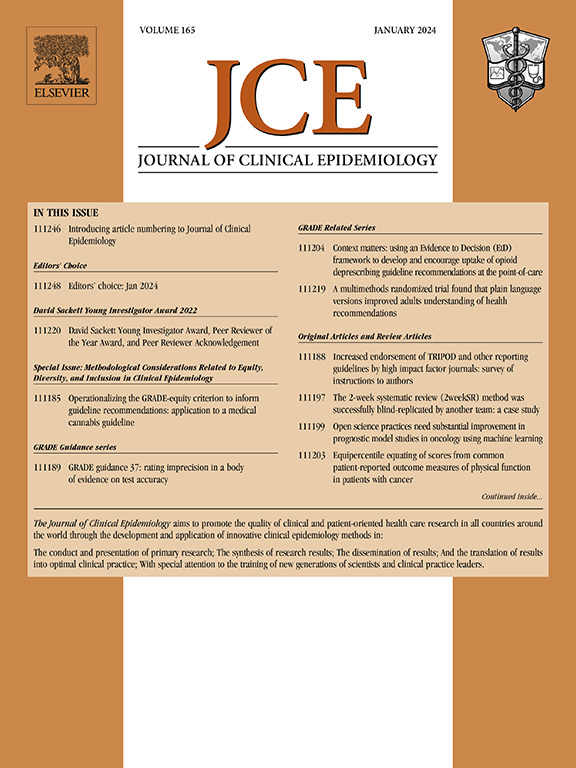Scoping reviews and their role in identifying research priorities
IF 7.3
2区 医学
Q1 HEALTH CARE SCIENCES & SERVICES
引用次数: 0
Abstract
Background and Objectives
Scoping reviews have been identified as appropriate methodologies to contribute to our knowledge. The objective of this review is to summarize how scoping reviews can be used to identify research priorities.
Methods
Based on our experience as evidence synthesis methodologists and researchers, the Joanna Briggs Institute (JBI) scoping review methodology group, have identified the potential roles of scoping reviews in identification of research priorities.
Results
Scoping reviews typically ask broad questions that allow researchers to obtain an overview or map of the existing evidence. Scoping reviews also incorporate multiple levels of evidence that enriches the strength of the knowledge that is gained. This value is revealed by the use of scoping reviews to contribute to and perform the following functions: 1) map a research area and identify gaps that need to be addressed; 2) prioritize research topics by identifying key issues to investigate; 3) identify the type of study designs that have been used to investigate a particular topic, and/or the range of outcomes measured following a specific intervention; 4) identify the essential contextual factors that are relevant to the study of a particular research topic; 5) identify equity issues in the research field; 6) assist in engaging stakeholders and/or experts in the field by facilitating the inclusion of these stakeholders within the research process; and 7) provide the relevant new knowledge to enhance and support applications for funding.
Conclusion
To ensure this contribution to identifying research priorities is reliable, scoping reviews must be performed following the existing rigorous methodological processes and adhere to the currently available reporting guidelines. By doing so, scoping reviews have great potential to identify research priorities, to guide the expansion of research and the generation of new knowledge.
范围审查及其在确定研究重点方面的作用。
范围审查已经确定为适当的方法来贡献我们的知识。本综述的目的是总结如何使用范围评价来确定研究重点。根据我们作为证据综合方法学家和研究人员的经验,JBI范围审查方法学小组已经确定了范围审查在确定研究重点方面的潜在作用。范围审查通常提出广泛的问题,使研究人员能够获得现有证据的概述或地图。范围审查还包含了多个层次的证据,这些证据丰富了所获得的知识的强度。这一价值是通过使用范围界定评审来揭示的,以促进并执行以下功能:1)绘制研究领域并识别需要解决的差距;2)通过确定研究的关键问题对研究主题进行排序;3)确定用于调查特定主题的研究设计类型,以及/或特定干预后测量的结果范围;4)确定与特定研究主题的研究相关的基本背景因素;5)识别研究领域的公平问题;6)通过促进将这些利益相关者纳入研究过程,协助参与该领域的利益相关者和/或专家;7)提供相关的新知识,以加强和支持资助申请。为了确保这种对确定研究重点的贡献是可靠的,必须按照现有的严格的方法过程进行范围审查,并遵守当前可用的报告指南。通过这样做,范围界定审查有很大的潜力来确定研究的优先次序,指导研究的扩展和新知识的产生。
本文章由计算机程序翻译,如有差异,请以英文原文为准。
求助全文
约1分钟内获得全文
求助全文
来源期刊

Journal of Clinical Epidemiology
医学-公共卫生、环境卫生与职业卫生
CiteScore
12.00
自引率
6.90%
发文量
320
审稿时长
44 days
期刊介绍:
The Journal of Clinical Epidemiology strives to enhance the quality of clinical and patient-oriented healthcare research by advancing and applying innovative methods in conducting, presenting, synthesizing, disseminating, and translating research results into optimal clinical practice. Special emphasis is placed on training new generations of scientists and clinical practice leaders.
 求助内容:
求助内容: 应助结果提醒方式:
应助结果提醒方式:


